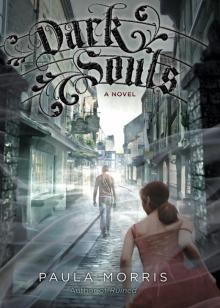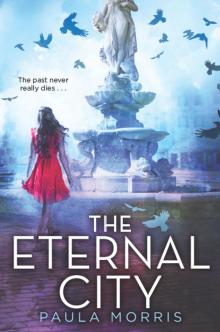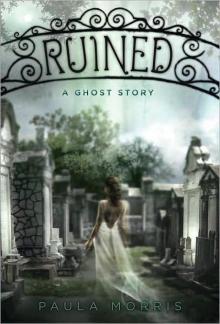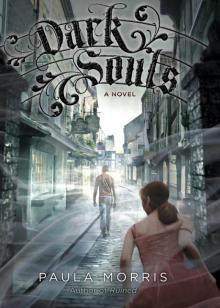- Home
- Paula Morris
Ruined 2 - Dark Souls
Ruined 2 - Dark Souls Read online
Dark Souls
A NOVEL
PAULA MORRIS
For Agatha and Matilda Devlin
HE THAT HAS LIGHT WITHIN HIS OWN CLEAR BREAST
MAY SIT I’ TH’ CENTER, AND ENJOY BRIGHT DAY,
BUT HE THAT HIDES A DARK SOUL AND FOUL THOUGHTS
BENIGHTED WALKS UNDER THE MIDDAY SUN;
HIMSELF IS HIS OWN DUNGEON.
JOHN MILTON, Comus
Contents
Cover
Title Page
Dedication
Epigraph
Prologue
Chapter One
Chapter Two
Chapter Three
Chapter Four
Chapter Five
Chapter Six
Chapter Seven
Chapter Eight
Chapter Nine
Chapter Ten
Chapter Eleven
Chapter Twelve
Chapter Thirteen
Chapter Fourteen
Chapter Fifteen
Chapter Sixteen
Chapter Seventeen
Chapter Eighteen
Chapter Nineteen
Chapter Twenty
Epilogue
Acknowledgments
Also by Paula Morris
About the Author
Copyright
PROLOGUE
At night, cornfields looked like the ocean. When clouds covered the moon, the vast darkness on either side of the road could be glassy bodies of water stretching into the distance. All they could see, driving home that night from the party in the farmhouse, was the road ahead, narrow and straight.
This was a game Miranda liked to play sometimes, even though she was sixteen and old enough to know better. She imagined that the country road was really following a rocky shoreline, that if they stopped the car and opened the windows, they’d hear nothing but lapping waves. They’d be in a different state — one that gazed out onto the Pacific or the Atlantic — not stuck in the middle of the country, in the sticky center of a dead-hot summer.
Maybe Rob, her older brother, liked to play the game as well. Maybe that night he’d forgotten that the darkness surrounding them wasn’t the black water of a quiet bay. It was a forest of tall corn, brown and wilting during the day, rustling in a late-night hint of breeze. He couldn’t see through that dark thicket. He couldn’t see the other car speeding along another road. He couldn’t hear it, either: Miranda and Jenna had turned up the radio because they’d finally found a song they liked. Jenna was in the front seat. She always liked sitting next to Rob, though she was Miranda’s friend — the only real friend Miranda had made since their parents dragged them, a year earlier, to live in a small college town surrounded by cornfields.
Jenna turned her head to say something to Miranda. She’d bent for ward, reaching to turn down the radio. The song had ended. Jenna was laughing.
There was a brightness, what seemed to be a spotlight piercing the passenger window. And then something slammed into them: The sound was like iron jaws crushing the car, crunching it. Everything was spinning, blurry. They were tumbling in the air — bumping, then tumbling again. Miranda remembered closing her eyes. She didn’t remember screaming. She didn’t remember the glass of her window cracking.
When Miranda opened her eyes, she was curled upside down, the seat belt barely holding her in place. Her face was stinging. Her neck, pressed hard against the roof of the car, ached. She didn’t know how to breathe, let alone speak. Her shaking hands and legs felt so feeble, so useless, she wasn’t sure if she could unfasten the seat belt.
But somehow she did. She stabbed at the seat belt lock until it clicked open, grabbing at the strap so she wouldn’t drop onto her head. And somehow she managed to shimmy out of the shattered window and onto the hard ground. Even the guys in the sheriff’s car, when they eventually got there, were impressed. They told her she’d done good. It took them much, much longer to cut Rob out of the driver’s seat. They had to send for a man with a truck. They kept telling Rob to hang in there because help was on its way. Any minute now, they said: You just have to hang in there, buddy.
It was a hot night, but Miranda was cold. She sat in the dust, a deputy’s jacket over her shoulders, the corn whispering around her. There was another car, a red car, upside down in the intersection. Men talked on radios. One of them gave her a half-empty plastic bottle of water. They said her brother was going to be okay, once they got him out of there. They said that when they got them to a hospital, someone would pick all the pieces of glass out of Miranda’s face. They said the red car must have flown through the stop sign. They said they were real sorry to tell her this, but the other girl in her car was dead.
Miranda knew this even before they told her. She could see Jenna, small and squashed, upside down in the front seat, her fair hair illuminated by headlights. Jenna’s eyes were closed, and her mouth was open. She had been about to say something, Miranda wanted to tell them. They’d been singing along to the song on the radio, mainly to annoy Rob, and then Jenna was about to say something. Now there she was, hanging in the front seat, the door smashed in around her.
Miranda shivered: The breeze had turned cold. She hung her head, blinking back tears. Someone was walking toward her, footsteps scuffing the dirt. When Miranda opened her eyes, she could see right away that it wasn’t one of the deputies. It was Jenna, in jean shorts and blood-smeared Blondie T-shirt, her charm bracelet glinting at her wrist. She didn’t have any shoes on: She’d taken them off in the car, Miranda remembered, because the straps were hurting her.
Miranda opened her mouth to cry out: She could still see the Jenna in the car, buckled and squashed and bloodied. But here was this other Jenna walking toward her, smiling. She drifted her fingers across Miranda’s scalp, brushing Miranda’s hair back from her stinging forehead. Jenna’s touch was gentle, but it felt like the iciest winter wind.
Jenna took another few steps into the field and disappeared, dissolving into the darkness. Miranda called out her name. She staggered to her feet, the jacket falling off her shoulders, calling Jenna’s name over and over again. The corn rustled back at her, keeping its secrets. One of the deputies got her to sit down again, and to drink some water. Miranda heard them saying that it would be better if she sat with her back to the car so she wouldn’t have to stare at her friend’s body trapped there in the front seat.
That night was the last time Miranda saw her friend alive. The last time Rob could sit in a car — or any confined space — without having a panic attack.
The first time Miranda realized she could see ghosts.
CHAPTER ONE
Miranda and her mother caught a taxi from York station, with three suitcases stuffed into the trunk, and the extra luggage piled between them in the backseat. Even though the sky was an ominous gray, Rob and her father said they’d walk.
Miranda’s mother opened her mouth to object, but then she changed her mind and said nothing. Miranda knew what her mother was thinking. It was a frigid cold winter’s day. The mist looked close enough to touch. They were in a foreign country, and a strange city — built on the ruins of an old Roman fort, an old Viking capital, a medieval stronghold. Its thick stone walls loomed over the station’s parking lot. The streets were narrow and winding; there was a river to cross.
“They’re sure to get lost,” her mother murmured, tugging the hem of her coat so it wouldn’t get slammed in the door. “But …”
She didn’t need to finish her sentence. Rob hated sitting in cars, especially small European cars where someone tall like him had to hunch. The only way they’d managed to drag him to the airport back in Iowa was because one of the neighbors drove a school bus. Rob spent the flight roaming the aisles or
standing around the back of the plane, looking out the window at the endless clouds. On the train across the Pennines, Rob paced the entire length — eight carriages — multiple times, until Miranda complained he was acting like a demented polar bear.
Ever since the accident, Rob couldn’t stand small, confined spaces. Whenever he felt trapped or surrounded, he got dizzy and sick.
“He’ll be okay, Mom.” Miranda would have squeezed her mother’s hand, but there were too many bags in the way. She did this kind of thing a lot these days — trying to reassure her parents that everything was okay, really, even when nothing was okay anymore. But she was tired of talking to doctors and listening to people ask how she felt.
There was nothing anybody could do about it. Nobody could bring Jenna back. And nobody could take away the guilt. Why was Jenna gone, and why was Miranda still here? And why had Miranda staggered around the smashed-up car like a dizzy fool when she could have tried to help Jenna, to save her? The only useful thing she’d done was dial 911.
Miranda and Rob’s doctor thought a family vacation far, far away was just what Rob and Miranda needed. Far, far away — those were his exact words. As though they’d be staying in a castle in a fairy-tale land, not a rented apartment in some wintry English city.
They were here in York because their parents wanted to be here. Jeff, their father, was a history professor, and he was giving a paper at a conference on Richard III, one of his scholarly obsessions. He was planning to come alone until Peggy, their mother, was invited last-minute to fill in as a guest conductor at the music festival held each December in York Minster.
“It’s on a street called the Shambles,” Peggy was telling the taxi driver, fumbling in her bag for her reading glasses and the directions she’d printed out. “Do you know it? It’s near something called … Coppergate. Is that one of the city gates?”
“Don’t worry, love,” said the driver. “I know where the Shambles is. And a ‘gate’ is what we call a street here — it’s an old Viking word. Coppergate, Petergate, Stonegate.”
The river Ouse — a name that once upon a time would have made Miranda snicker — was a steely gray, glazed with patches of ice. Bare trees lined the riverbank. Even the geese taking shelter beneath them looked cold, their feathers bristling in the wind. A garish tourist boat, with an open top deck of red plastic seats, was moored on the far side. The chalkboard propped on the deck read No Tours Today.
“You see,” the driver went on, “what you’re calling a gate, we call a bar.”
“A bar?” Peggy echoed.
“Bootham Bar, Monk Bar. Some of the old entryways to the city. And what you’d call a bar, we call a pub. Plenty of those in York.” The driver shot them a grin over his shoulder. “Just remember — streets are gates, gates are bars, bars are pubs.”
“That’s funny.” Peggy’s laugh was nervous. She bent toward Miranda and lowered her voice. “Your father will never find it.”
They passed one of these bars — sand-colored stone, with a gaping archway. A stairway led to another chunk of city wall, a couple of stories high. Miranda gazed up at the bobbing heads of people walking along it. Behind them, she could just make out the ivory peaks of the huge medieval cathedral.
“Look, Mom,” she said. “That must be York Minster.”
Peggy wriggled and ducked, but Miranda realized it was impossible for her to see over the hillock of bags.
“One week from Sunday,” sighed Peggy, talking about the concert. “For better or worse.”
The orchestra would be performing in the Minster, a building that was almost a thousand years old but still taller and more imposing than any other in York. Miranda’s mother had been breathing, eating, and sleeping the concert ever since she got the gig.
The taxi turned: A long stretch of wall was visible now, sitting high above a green gully. Miranda was hoping to spend a day, at least, exploring the medieval walls. When she was little, she had dreamed about living in a castle. Her doll’s house — pink, plastic, fake colonial — looked so generic compared with the sprawling stone edifices, with their moats and drawbridges and arrow slits, that she read about in books. She never saw herself as a princess, never bought into what her father jokingly referred to as the Disney Industrial Complex. When she’d thought about living in a castle, it didn’t involve fluttering around in a gauzy dress, waiting to be kissed or rescued.
Instead — not that she would have admitted this to anyone, especially Rob — Miranda had imagined herself scampering along lofty battlements, dodging the raining arrows of marauders, or seated at a feast in the Great Hall, watching acrobats tumble and bears dance, warmed by a roaring fire and the heady taste of mead (whatever that was) in a pewter goblet. Silly fantasies, she knew, especially as she learned more about history. The past had its darkness, its nasty secrets. Castles were drafty and cold in winter, smelly in summer. People starved to death in them during sieges. Belowground, where they never saw the light, prisoners were kept chained.
Still, it was the sinister parts of the past that made it interesting. According to Miranda’s father, Richard III had supposedly murdered the two young princes, his own young nephews, to grab the crown for himself. They didn’t come much more sinister than that.
“Problem for you ladies is them bags,” the driver was saying. “Cars can’t drive along the Shambles. I’ll get you as close as I can, but then you’ll have to walk.”
“Great.” Peggy sighed again. She looked tired, Miranda thought, after two flights and the train ride. In fact, both of their parents had looked tired for months.
“We’ll manage,” Miranda told her, though she didn’t know how they would, exactly. It was too cold to stand around on the curb, waiting for Rob and her father to turn up. And the place they were staying was “a quaint upstairs flat, with old-world ambience,” according to her mother, who could recite the website. In other words, no doorman, no concierge, no porters — and no elevator. The Shambles: not a bad description for day one of the Tennant family’s vacation.
Climbing out of the taxi, Miranda could see right away that the street was too narrow for cars. It was lined with old, half-timbered houses, some leaning so far forward it looked as though you could pass things from one upstairs room to another, right across the street. Even though it was a dank and miserable Friday afternoon, the street was thronged with tourists.
Miranda followed her mother up the street, wishing people would get out of her way. Couldn’t they see she was dragging two suitcases, wearing Rob’s messenger bag, and trying to keep a grip on her own purse? She didn’t know what Rob had packed in his bag — concrete and bricks and industrial-size boxes of Xanax, maybe.
“It’s just like Harry Potter, isn’t it? Like Diagon Alley!” said Peggy, sounding overly cheerful. Miranda tried to muster an enthusiastic smile. Sometimes her parents forgot that she was sixteen now, not six. Though she had to admit: It did kind of resemble Diagon Alley — quaint and rustic. Every house in the street looked hundreds of years old. Throw in a thatched roof and a wand store or two, and the picture would be complete.
Most of the lower floors of the buildings along the Shambles were stores selling expensive souvenirs or chocolate or watercolor views of the Minster. A group of young Japanese tourists, wearing Burberry scarves and transparent rain ponchos, stood in a clump outside a tiny art gallery, taking photographs of each other with their cell phones. A middle-aged woman carrying a bulging plastic bag of groceries bumped into Miranda and apologized: She seemed to have materialized out of nowhere, until Miranda noticed the slivers of alleys that connected the Shambles with what looked like an open-air market.
Miranda paused to readjust her cargo. Her mother, farther up the street, had stopped underneath a hanging painted sign that read DEVLIN’S PIES AND FANCIES.
“I’m just going in to get the key!” Peggy waved the crumpled booking sheet she was clutching. She mouthed the words the key again while stabbing her finger at the ground-floor shop — as though M
iranda were deaf or stupid — and then disappeared through the door, abandoning two suitcases outside.
Miranda had to scramble up the street as best she could, suitcases bumping along the cobblestones, to stand guard. Her father and Rob were taking their time getting there. They’d probably dropped into a bar — sorry, pub — on the way so her father could try a pint of Ye Olde Warm Ale.
Miranda stood with her back to the shop window. Hopefully, this flat wouldn’t be too bad. Her mother said they were the first visitors to stay there, ever. The upper floors had been used for years as storage space for Devlin’s, and the renovations were completed only a month ago.
The building directly across the street looked as though it could use some renovations as well. Miranda was amazed that its slumping top two stories managed to stay up. Unlike its neighbors, which were either scrubbed brick or freshly painted, this house was peeling and derelict. All but one of its windows were boarded up. It looked completely out of place in such a picturesque historic street.
When the swarm of camera-toting tourists in front of her moved on, Miranda noticed someone leaning against the house’s boarded-up doorway. He was a young guy, a couple of years older than Rob, maybe. He wore a long black coat — grubby, worn leather, with buttons missing — and he was gazing into space. He was tall and gaunt, and he had the most ferocious dark eyes Miranda had ever seen, though maybe they just seemed intense because his face was so white: He was as pale as a vampire.
Miranda didn’t mean to stare, but there was something interesting and “off” about him. Boys at home didn’t look like him — not even the college students. He wasn’t good-looking in any sort of conventional way. He was too thin, too pale, too sullen.
He turned his head and caught Miranda looking. She shrank back against the shop window, her face sizzling, wishing she could disappear into the ground or at least behind her luggage. Before she glanced away, Miranda glimpsed the look on his face. Not interest, not indignation. Suspicion.

 Dark Souls
Dark Souls The Eternal City
The Eternal City Unbroken
Unbroken Ruined
Ruined Ruined 2 - Dark Souls
Ruined 2 - Dark Souls